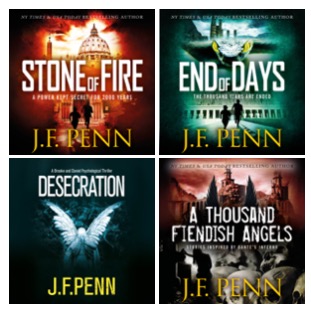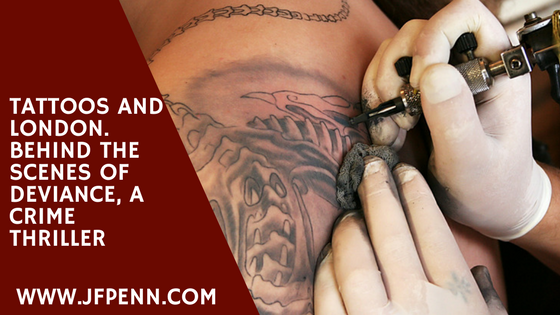 If you love crime fiction, then you'll love CrimeFiction.fm, which is a great show where Stephen Campbell interviews authors about their books. I was on the show talking about Deviance recently.
If you love crime fiction, then you'll love CrimeFiction.fm, which is a great show where Stephen Campbell interviews authors about their books. I was on the show talking about Deviance recently.
You can listen to the show here, and you can read the transcript below.
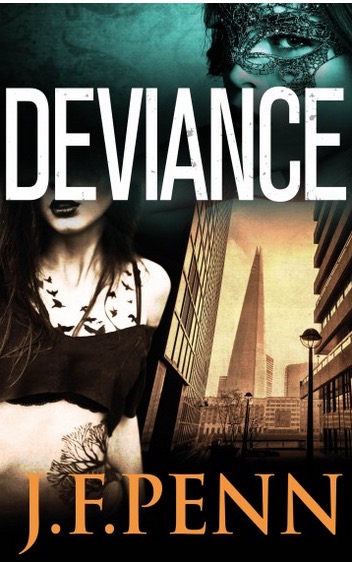 Stephen: Welcome back to CrimeFiction.FM, where we bring the authors of today's best novels directly to you. I'm your host, Stephen Campbell, and I'm here with New York Times and USA Today bestselling author, J.F. Penn. Her latest work, Deviance, the third in her London Psychic Crime Thriller Series was released last week. Joanna, welcome.
Stephen: Welcome back to CrimeFiction.FM, where we bring the authors of today's best novels directly to you. I'm your host, Stephen Campbell, and I'm here with New York Times and USA Today bestselling author, J.F. Penn. Her latest work, Deviance, the third in her London Psychic Crime Thriller Series was released last week. Joanna, welcome.
Joanna: Hi Stephen. Thanks for having me on the show.
Stephen: It's always a pleasure to hear your voice. Before we get into Deviance, could you tell us a little bit about Jamie Brooke and Blake Daniel, the characters that make up this trilogy.
Joanna: So Jamie Brooke starts in the first book in the series, Desecration, as a British detective. It's set in London, and so basically we're solving murders, but Jamie ends up working with Blake, who is a researcher at the British Museum. He also has a psychic ability, so he can touch objects and he can read the emotional resonance and the history of that object. So Blake helps Jamie solve the crimes in the book, so Desecration, Delirium, and now Deviance.
By the third book, Deviance, Jamie has actually left the police, she's a private investigator, and once again calls on Blake to help when a friend of theirs goes missing. At the same time, lots of bodies are being found around London with tattoos filleted from their skin.
Stephen: Tattooing is one of the themes that you explore in this book, and you always seem to dig into a specific theme with each of your books. So why tattoos with this one?
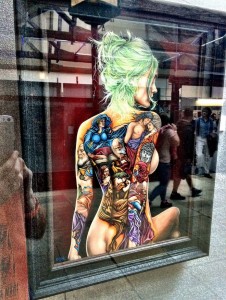
Joanna: Well, it's funny when I wrote Desecration, which is very much about the physical body while we're alive and when we're dead. So I was really fascinated by tattooing because while we're alive tattooing on our living bodies is like an art. There are many people who now go quite mad with tattoos. So that was the first book. Delirium was about the mental world and exploring bedlam and madness and that kind of thing.
And then in Deviance I revisit a character from Desecration.
Her name is O, and she has this full body tattoo of an octopus, like really amazing. Which is
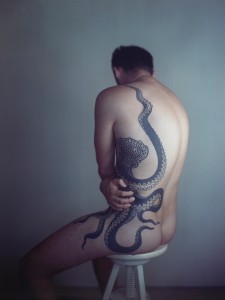
actually a picture I saw in the National Gallery and it sparked the whole idea.
So for me, it was almost revisiting a topic I started on in Desecration, which is the kind of body modification movement, and people with implants, things that are quite extreme for many of us. And I know you are going to ask, but I don't have a tattoo. I don't have…
Stephen: You pre-empted my question!
Joanna: Personally, I'm very vanilla but I'm absolutely fascinated by people who go through this kind of thing. And the research was so interesting, because they say because of our mainly secular Western society that people are craving spiritual experience. The right of passage of tattooing is ancient. In many tribes, tattooing marks a rite of passage and the pain you go through, the blood and the sacrifice of a bit of yourself can really have a powerful effect.
So I read stories of people who'd undergone awful operations, terrible scarring, you know, mastectomies and they reclaimed their body by tattooing with a powerful image. I read a lot around the psychology of that and to me, that's just fascinating. And in Deviance, the murderer is cutting tattoos off people. Tattooing is quite common in London, so there's quite a lot of people to target.
And O goes missing, she has a full-body tattoo so things don't really bode well for her. So how do we find her?
And I found so many really interesting characters as I researched this. For example, you can actually now hire somebody so when you die, your body gets sent to them, and they will preserve your tattoo after your death. Which is like, wow, that's pretty hard core!
Stephen: That's out there!
Joanna: Yes! So I think why I write books, why I write fiction, one of the reasons is to go deep into things that I'm fascinated with, and things that might make me feel a little bit weird, you know.
If there's a physical reaction to a topic, that's something I want to explore in my writing …
because that really is the edge of what we consider acceptable. That's really why the book is called Deviance.
But the question is about the deviants in the book, you know, who is the sinner and who is the saint? You know, who really is deviant in a world where bankers who wear suits and ties can be the biggest criminals and tattooed people on the street are actually the good guys. So that's the stuff behind it.
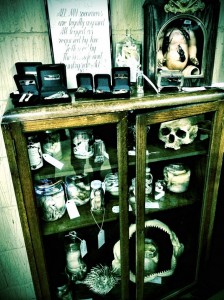
Stephen: Now, as a reader I'm a little older than you. I'm considerably older than you. I'm considerably older than most people, but I've never really understood the whole tattoo thing. I see it, and it puzzles me. But I understand it better now in reading your book, and I'll bet there are lots of other people that understand it a little bit better as well.
Joanna: Oh, good. You know, I really think part of it is investigating a topic that makes you feel a bit uncomfortable, with the aim of potentially changing your mind about judging people.
The other thing I found very fascinating was that many people who have tattoos, including facial tattoos and, who we would potentially look at and think, ‘oh, avoid that person because they look weird or they look different.' Most of those people are chronic introverts.
They often use tattooing or body modification as a way to keep people away from them because they're either really shy or they're just people who might have a difficult self-image and the tattoos mean certain things.
It really is a fascinating topic. I learned in my research that you shouldn't judge a person by what they put on their skin. And also, the other thing I learned is that you shouldn't ask people what the meaning of their tattoo is, because often they don't even know.
[You can see lots of the tattoo images and more pictures that inspired the book on my Pinterest Board for the book.]
Follow J.F.'s board Deviance on Pinterest.
The powerful totem figures that people put on their skin, they often don't realize why they've chosen that. Which I also found crazy weird, because, you know, I've thought a lot, and, in fact, the cover of Deviance has a woman with a crow tattoo, like flying crows, and I love that tattoo. I think it's actually gorgeous.
The crow is an image in the book. The Morrigan, the Celtic goddess is the crow goddess of death and war.
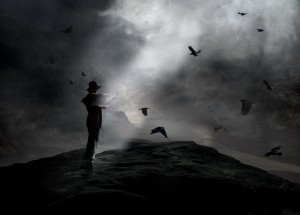
In London the crows are a kind of totem figure. So for me that crow tattoo, and the sort of flying birds became a bit of a motif for the whole thing. So if I was to get a tattoo, it would be similar to that.
Stephen: And how big would it be?
Joanna: Oh, that's under discussion 🙂
Stephen: All right, you mentioned research several times while you're describing your work, and from following you and your work over the years I know that you're sort of a research geek. It's just something that you love doing, and it's something that really fuels your writing.
What kind of specific research did you do for this book?
Joanna: I get my story ideas from the environment and from places.
I live in London and one of my favorite walks is to come out of the London underground at London Bridge for Borough Market. And from Borough Market, which is a very old, like a thousand-year old market.

You can look up and see the Shard, which is one of the tallest buildings in Europe. It's this gorgeous glass shard going up into the sky. And it actually has offices and things in it.
Also around there, there's the Old Operating Theater. That's one of the oldest hospitals.
It's the area where Chaucer set off on the Canterbury Tales. It's a very historical area. It's right by Shakespeare's Globe. It's right by the Tate Modern, which is a big art museum. It's an incredible area.
What's so interesting is during the Medieval Period it was outside the City of London, it was the red light district. Southwark Cathedral used to run the brothels on Southbank. This is all historical. So the church was running the brothels at the same time as it was a sin to go to a prostitute.
Then there's a graveyard that's under dispute called Crossbones, which is full of the bodies, the bones from 500 years ago, women and children.
The Outcast Dead, as they're known, are buried here in unconsecrated ground.
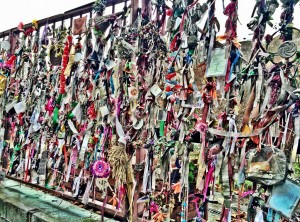
The church, even though they ran the brothels, did not allow the women and their illegitimate children to be buried in consecrated ground. And now that land is incredibly valuable, so the developers want to take that land and make luxury flats.
So for me the story was, oh my goodness, the church used to run the brothels, which is like wow, there's definitely a story there.
So who is the sinner, and who is the saint?
Is the prostitute the real sinner here? Or the city men?
And then the second thing is that this land grab of Crossbones graveyard by the developers just made me go, wow that's kind of crazy and this is all real.
So you can go to Crossbones, you can see what I describe it in the book. The ribbons on the gate in memory of the Winchester Geese, the prostitutes. And it's just a fascinating area. So much of Deviance is based on real London and I'm actually going to build a walking tour of the London sites from the series.
Stephen: Oh how fun!
Joanna: So you'll be able to walk the different places because every single place is real.
And the tattoo convention that I describe in the book, we actually went to as well. Probably all of my books, both the London Psychic Series and my ARKANE series, probably 90% of the books are truth.
Then I just make up some characters, but it's as close to real life as I can possibly make it.
Stephen: Now one of the things that you do consistently in your books is while you're researching you spend a lot of time in a given area, and then you describe it just beautifully and perfectly so that the reader can really get a sense of where the characters are in the book. And then occasionally you'll try and blow it up.
Joanna: I can't help but blow up things! I do that more in the ARKANE Series, to be fair.
Stephen: But you did a little bit of it in this one too.
Joanna: Well, you know, I can't help it … No spoilers.
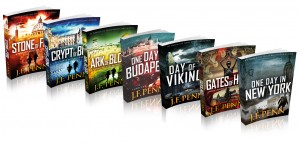
Why the two different series?
Joanna: Well, I think, as an author, it's very easy to fall into a rhythm of writing the same series that people enjoy.
So I love the ARKANE books. They're action-adventure, based around religious and supernatural mysteries and Morgan Sierra goes around the world having fun.
Then I wanted to write something that was more British and crime focused. And so I really set out to write a British crime novel with a British detective, but I really didn't intend it to have any supernatural side. But then as I started writing it, I had the experience in the Hunterian Museum that opens in Desecration.
I came up with Blake Daniel, who's psychic. It's normally a woman who is a psychic in stories, but Blake is a man. He's mixed race, half Nigerian, half Swedish. He just came to me fully formed.
I wanted to write something set in London specifically.

And one of the things that marks out the ARKANE thrillers is the international side. They pretty much flit from place to place, except for my ‘one day' novellas for example, One Day In Budapest is just set in Budapest, for example.
But the ARKANE books are definitely more international, whereas the London Psychic series really is very densely about London. You can't walk a meter without finding so much history. It's just crazy. I wanted to test myself both on a creative level, but also the London Psychic Series is darker than the ARKANE books.
They really are just an action-adventure romp, based on the Clive Cussler type of books, Dan Brown, you know. Whereas the London Psychic books I really feel are probably more intelligent thrillers, you know. They have an edge of deeper meaning and it's been a real challenge to write them, but absolutely fascinating. And I've got to know London a whole lot more. So it was both a creative challenge and also a desire to offer something else to my readers.
Stephen: It seems to me, that you select things to write about that you're deeply interested in.
The ARKANE Series, you mentioned, it's globetrotting. You're a globetrotting person. You do a lot of travel.
You love to travel. You seem to love history. You love doing research.
Is this like a big circular thing for you, where you just keep feeding all of these interests that you have? Or does one feed the other?
Joanna: Oh, you busted me, Stephen!
When I thought about my dream job, when I was still in my corporate job a number of years ago and was really looking for another life, I was like, what do I want to do with my life?
I want to travel. I want to read. I want to write. I want to learn things. I want to create new things in the world.
And for me the life I have now is exactly that. I said to my husband, Let's go to Budapest – I'll write a book in Budapest. So I did: “One Day in Budapest“.
And then we moved back to London from Australia, and that's when I started the London Psychic Series because it's my life here.
The opening scene of Gates of Hell is at La Sagrada Familia in Barcelona and I wrote that just after a weekend there. We're planning a big trip to Japan because I specifically want to research these particular Japanese mummies and so it is actually a circular process.
“Destroyer of Worlds”, which is the next ARKANE book has got a lot of India in it, and a few years ago we cycled through southern India.
So it's both. I get ideas from the world, and then when I want to
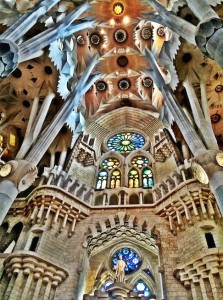
write a book about something, I look at somewhere I want to go, and then have a tax-deductible trip. So I have like the best life!
Thank you to all the readers listening who fund my travel addiction! But honestly, we laugh about that, but I do think that one of the most important things with a story is to take the reader out of their current situation.
I used to read thrillers when I was in my miserable day job. I hated my job, so at lunch time I would go and buy a book and generally it was an action-adventure thriller, so I could be somewhere else in the world for half an hour. And I would read on the train, and I would actually live in this other world for a time.
So for me now, my whole aim with these books is to help other people escape their lives just for a little while.
I'm hoping that everybody has a wonderful life, but sometimes we all need escape. I'm a readaholic and I love escaping mentally. I obviously do sit at my desk a lot, so I love escaping daily life to live in somebody else's world. As much as I laugh and say that I travel a lot and have a lot of fun, I also work really hard to give the reader a good experience.
Stephen: And you're also one of those people who I'm fairly certain can work while you're on the road.
Joanna: I'm always taking pictures and I use Things app on my phone. I've got a folder for fiction ideas and I'm always writing down ideas.
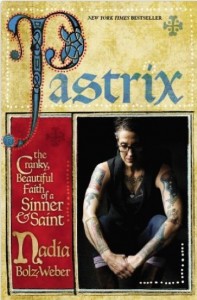
A “Pastrix” is a female pastor, and I read her autobiography, and she became a real sort of character for me. Obviously I changed a lot of things about her, as with any character but she was the inspiration as a strong woman.
So definitely, I find inspiration everywhere. And it might take years to end up in a book, but I believe in emergence, that if I just write down my ideas when I'm writing a book, it will somehow come out of my brain again. It will emerge from my subconscious at the right time.
Stephen: What a wonderful skill.
Joanna: Well, I don't think it's a skill. I mean, I'm a little bit semi-spiritual in that sense in the same way that Steven Pressfield is in “The War of Art” for example. He talks about the Muse with a capital M. So does Stephen King, actually. It's all quite mysterious. I do read back some of what I've written and go, where the hell did that come from?
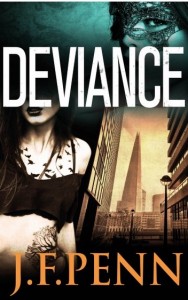
Buy now in ebook and print formats. Coming soon in audio.

